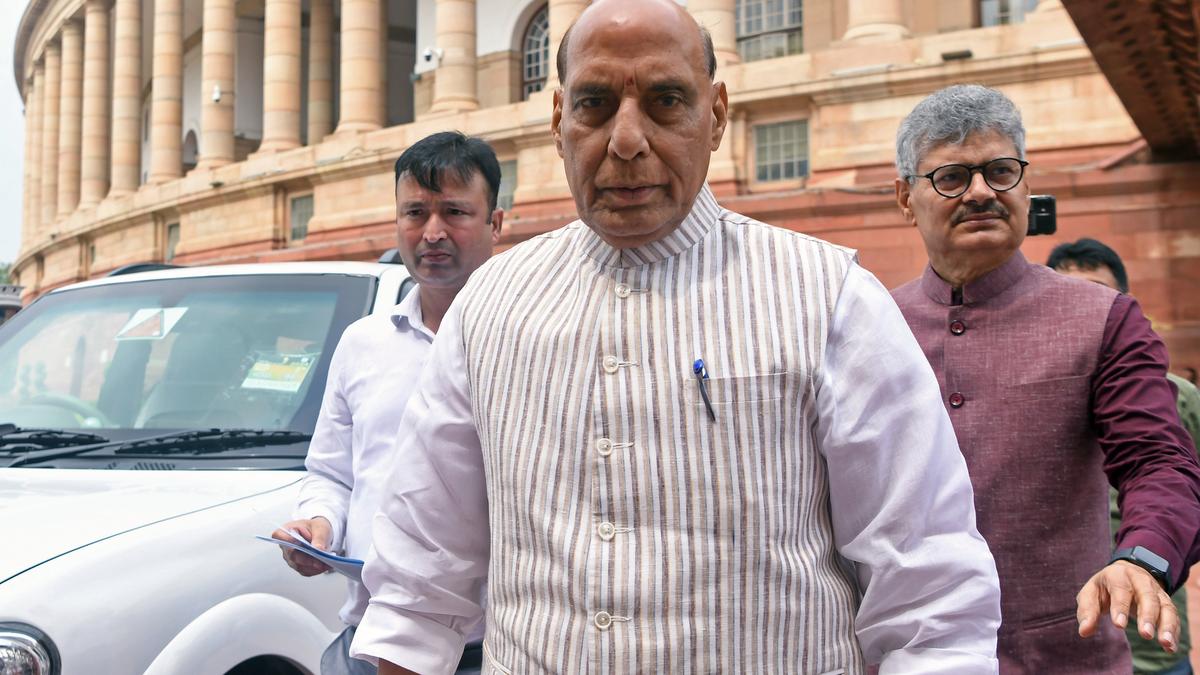Defence Minister Rajnath Singh at the Parliament House during the Monsoon Session, in New Delhi.
| Photo Credit: ANI
Citing “national security”, the Defence Ministry has refused to divulge details on the shortage of personnel in the armed forces, which in the past was regularly given out in written responses to questions in Parliament.
“The information sought is a sensitive operational matter concerning national security and it would not be in the national security interest to divulge related details in the public domain,” Minister of State for Defence Sanjay Seth said in a written reply in the Rajya Sabha on August 5. This was in response to a question from Member of Parliament Anil Kumar Yadav Mandadi who asked whether the government has taken note of the fact that there is “shortage of staff, including officers, soldiers, medical officers etc., in the armed forces,” if so, the details thereof; and whether the government “has taken any comprehensive measures/steps to fill the vacancies” that are existing.
Till recently, it has been a regular practice to give information to such questions. For instance, in response to a question from MP Javed Ali Khan in the Rajya Sabha on March 13, 2023, then Minister of State in the Defence Ministry Ajay Bhatt said in a written reply that vacancies in the Army as on March 10, 2023 was officers – 8,070 and Junior Commissioned Officers (JCO) and Other Ranks (OR) – 1,27,673. He further stated that from January 1, 2023 to March 10, 2023, the vacancies filled up for officers were 613 and for JCO/ORs it was 19,065.
Agnipath scheme
On June 14, 2022, the government announced the Agnipath scheme for recruitment of soldiers into the armed forces for four years, doing away with the earlier process. The overall intake has been capped at 1.75 lakh till 2026 and Agniveers on completion of four years will get an opportunity to join regular cadre and up to 25% will be selected through another recruitment process.
Similarly, in response to a question from MP Dr. Fauzia Khan on August 8, 2022 Mr. Bhatt informed the Rajya Sabha that on an average, 60,000 vacancies arise in the three armed forces every year due to superannuation, premature retirement, medical reasons, casualties etc. “Currently, there is a shortfall of 7,799 officers and 1,08,685 soldiers in the Army; 1,446 officers and 12,151 sailors in the Navy; and 572 officers and 5,217 airmen in the Indian Air Force.”
Stating that during the years 2020 and 2021, the recruitment process was severely affected due to COVID-19, Mr. Bhatt added, “However, with the improvement in the COVID-19 situation, the recruitment process for the year 2022 has commenced.”
Kharge’s poser
Questioning the government on this, Congress president Mallikarjun Kharge in a post on social media platform ‘X’ tagged Prime Minister Narendra Modi and said that “fake nationalists of the BJP who imposed the Agnipath Scheme on our patriotic youth, and destroyed their future, have now refused to put this key information in the public domain.”
“Modi ji, your own government has been publishing this important information on the number of vacancies of officers, soldiers, JCOs and medical officers, from time to time, since the past few years. We fail to understand, why suddenly you have refused to provide it now,” Mr. Kharge said. “Are you afraid that this information on the number of vacancies will further put a question mark on the ill-thought Agniveer induction which you have unilaterally imposed on the armed forces? In the Rajya Sabha, there have been previous instances where the Defence Ministry has provided this key information. Why stop now?”
The Congress chief also listed out seven times since 2019 when questions related to shortages were answered in the Rajya Sabha. As per latest figures provided by your government in March 2023, over 1.55 lakh posts are vacant in the armed forces, Mr. Kharge said, while stating that “real national interest” demands that the actual number of vacancies in the armed forces be made public, so that “comprehensive measures” are taken to fill those vacancies to protect the territorial integrity of the nation.
No recruitment due to COVID for over two years combined with limited intake under the Agnipath scheme are going to increase the shortage in personnel over the next few years and the armed forces, especially the Army, have been pushing for increasing the intake as well increasing the retention rate of Agniveers from 25% to at least 50% on completion of four years.






